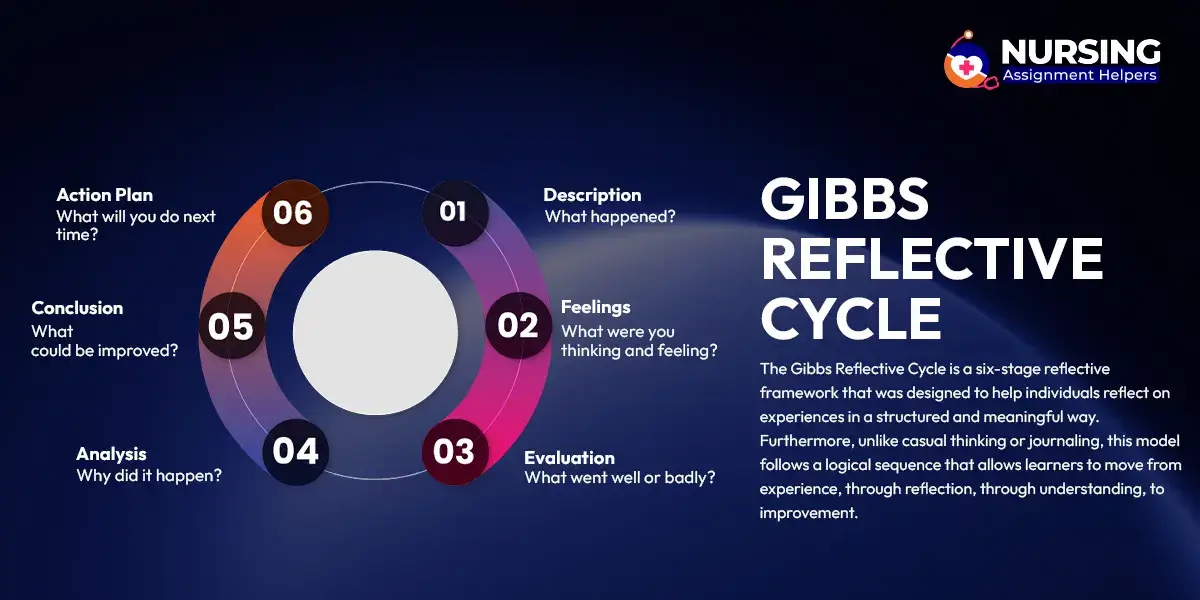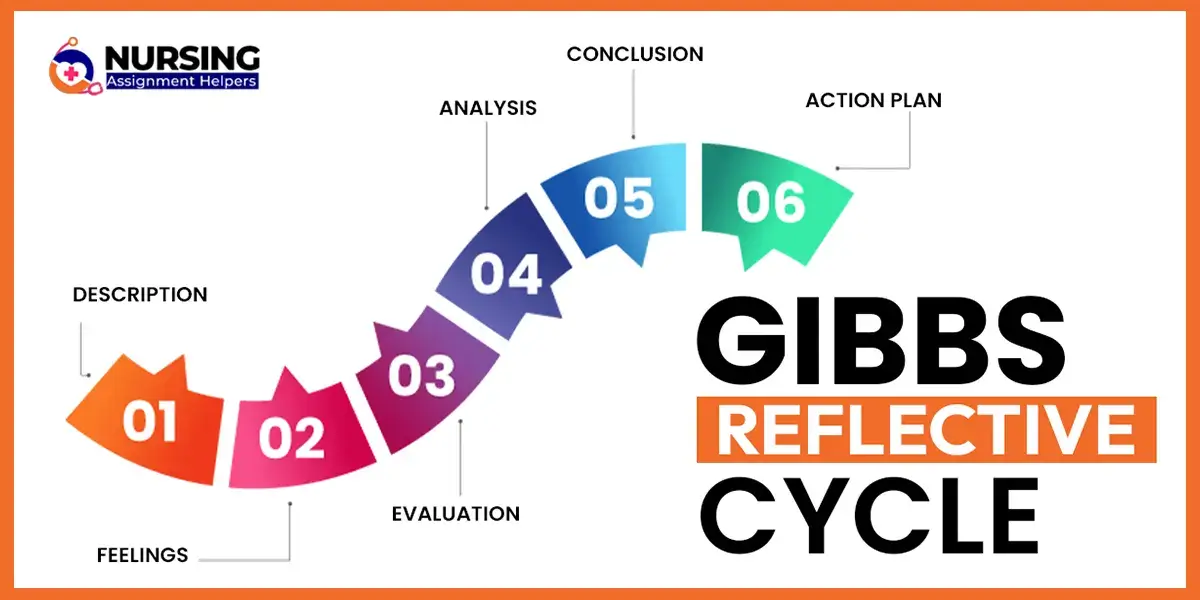In today’s fast-paced academic and professional world, simply gaining experience is not enough. What truly sets successful learners and professionals apart is their ability to reflect, learn, and improve continuously. This is where the Gibbs Reflective Cycle becomes a powerful tool. Introduced by Professor Graham Gibbs in his 1988 book Learning by Doing: A Guide to Teaching and Learning Methods, this structured framework for learning from experience.
Whether you are a nursing student, healthcare professional, corporate learner, or educator, reflective practice helps you understand your actions, evaluate outcomes, and develop better strategies for the future. Furthermore, among various reflection models, the Gibbs Reflective Cycle stands out for its structured, easy-to-follow approach and real-world applicability.
In this blog, we will walk you through what the Gibbs reflective cycle is, why it is essential, its benefits, limitations and role, along with the practical tips of using it effectively.
Come on! Let’s get into it.
What Is Gibbs Reflective Cycle?
Firstly, introduced by Graham Gibbs, the Gibbs Reflective Cycle is a six-stage reflective framework which was designed to help individuals reflect on experiences in a structured and meaningful way. Furthermore, unlike casual thinking or journaling, this model follows a logical sequence that allows learners to move from experience → reflection → understanding → improvement.
The best part about using the Gibbs cycle is that it is simple and clear. Also, it is widely used in:
- Nursing and healthcare
- Education and teacher training
- Social work and psychology
- Business and leadership training
- Continuing professional development (CPD)
It was created to encourage reflection and learning from your past experiences.
Why Is the Gibbs Reflective Cycle Important?
The reason why Gibbs Reflective Cycle is essential is because it has the ability to turn everyday experiences into valuable learning opportunities. Moreover, instead of repeating mistakes or relying on trial and error, this model encourages purposeful improvement.
Moreover, this cycle provides you a complete framework for self-improvement. Also, it plays a role in both personal and professional progress by encouraging you to think of the events and study your emotions, reactions, critically etc.
Key Reasons Why Gibbs Reflective Cycle Matters:
Here are the top reasons why Gibbs Reflective Cycle matters in different aspects of life. For example:
- It promotes structured thinking and self-awareness
- Moreover, it encourages accountability and responsibility allowing to you know about your actions.
- Using this cycle allows you to improve your decision-making skills
- It even enhances emotional intelligence
- The best part is it supports continuous professional development
- Additionally, it strengthens academic writing and critical thinking
In today’s ever-evolving world. It is essential for you to adopt the Gibbs Reflective cycle as it can hone your leadership style, help gain knowledge from your experiences and encourage a culture of ongoing development among your team members. Also, this reflective cycle is very useful for the nurses that are practicing clinical medicine. It can even help them work on their nursing assignments by facilitating the MNS reflection on clinical practice and converting this clinical experience into a useful learning opportunity for both professional and personal growth.
The Six Stages of Gibbs Reflective Cycle

The Gibbs Reflective Cycle consists of six interconnected stages. They include:
- Description
- Feelings
- Evaluation
- Analysis
- Conclusion
- Action Plan
Furthermore, each stage plays a vital role in transforming expeirneces in actionable learning. Come on! Let’s get into it.
| Stage | Purpose | Key Focus |
|---|---|---|
| Description | Setting the context | What happened? |
| Feelings | Emotional awareness | What were you thinking and feeling? |
| Evaluation | Outcome assessment | What went well or badly? |
| Analysis | Deep understanding | Why did it happen? |
| Conclusion | Learning summary | What could be improved? |
| Action Plan | Future improvement | What will you do next time? |
Come on! Let’s get into these steps in detail.
1. Description – Understanding What Happened
The first step is to understand what happened. This focuses on presenting the situation clearly and objectively.
Ask yourself:
- What exactly happened?
- Who was involved?
- Where and when did it occur?
- What role did you play?
Answering these questions is essential. Now, the question is:
Why is this stage important?
It lays the foundation for reflection and provides accurate context. Furthermore, without clear description, reflection becomes vague and ineffective. If you want to strengthen your reflective assignments, make sure to write factual and concise descriptions.
2. Feelings – Exploring Emotional Responses
This stage is all about talking about your feelings. It allows you identify emotions connected to the experience. Therefore, you should consider:
- What were you thinking at the time?
- How did you feel during and after the event?
- Furthermore, did emotions influence your behaviour or decisions?
Why is this stage important?
Exploring emotional awareness helps enhance your communication skills, improve empathy, and professional behaviour, especially in healthcare and education settings. Additionally, be honest with your feelings as authenticity makes reflection more impactful.
3. Evaluation – Identifying Positives and Negatives
In this stage, you identify the positives and negatives. Also, you assess what worked well and what didn’t.
Make sure to focus on:
- Successful actions
- Mistakes and Challenges
- Outcomes for yourself and others.
Furthermore, why is this stage essential?
The reason is simple. It helps maintain balanced thinking by recognizing strengths while addressing weaknesses. Also, don’t ignore your wins as learning comes from both success and failure.
4. Analysis – Making Sense of the Experience
This is the most critical stage. In this you need to make sense of the experience where deeper learning occurs.
Ask yourself:
- Why did this situation happen?
- Additionally, what factors influenced the outcome?
- Also, how does theory relate to practice?
Why is this stage important?
Also, it connects experience with academic knowledge and professional standards. Additionally, it improves critical thinking skills. You can strengthen your analysis by linking theory, research and real-world practice.
5. Conclusion – Identifying Learning Outcomes
At this stage, you will have to summarize what you have learned. Make sure to reflect on:
- What could you have done differently?
- What skills need improvement?
- What have you gained from this experience?
Now the question is, why is this stage essential?
Well, it turns reflection into meaningful personal and professional insights. Just make sure to clearly state your learning points to make your reflection purposeful.
6. Action Plan – Preparing for the Future
This is the final stage. It focuses on improvement strategies and preparing for the future. Also, think about:
- What steps will you take next time?
- How will you apply this learning?
- What training or support do you need?
You must be wondering why this stage is essential.
The reason is simple. It ensures reflection leads to real change, not just awareness. Make sure to create a strong action plan to transform reflection into success!
Struggling to Applying Gibbs Reflective Cycle?
Are you facing problems in writing your essays using reflective essays? Consider connecting with the Nursing Assignment Helpers UK. The experts can help you apply this cycle and enhance your assignments.

Importance of Gibbs Reflective Cycle in Nursing
Whether you are a nursing student or a healthcare professional, the Gibbs Reflective Cycle in Nursing is particularly valuable due to the emotional, ethical, and technical nature of healthcare work.
Why Nurses Use Gibbs Reflective Practice:
There are several reasons why Gibbs Reflective Practice matters. It can help them
- Improve patient safety
- Furthermore, it enhances clinical decision-making
- It even strengthens communication skills
- Moreover, it encourages ethical awareness
- Also, it supports emotional resilience
Example Scenario
Nurse Reflection on a Medication Error Corrected Before Administration
Here is a little example to help you understand how you apply the Gibbs Reflective Cycle as a nurse in your daily routine.
Description: What Happened
During a routine shift, I was assigned to administer medications to a group of patients. One of the medications was a high-alert drug with a complex dosage calculation. Upon reviewing the patient’s chart and preparing the medication, I noticed a discrepancy in the dosage that I had prepared and what was written on the doctor’s orders. Fortunately, I was still in the process of preparing the medication when I realised the error. After double-checking the chart and confirming the dosage with a colleague, I got to know that I had misread the doctor’s handwriting, which caused the initial confusion. Thus, I stopped the preparation immediately and communicated with the prescribing physician, who confirmed the correct dosage. The error was caught before the medication was administered. Thus this ensures the patient’s safety.
Feelings: Anxiety and Responsibility
At first, I felt a sense of fear and anxiety. Also, the medication errors are serious. Therefore, I was worried that my mistake could have harmed the patient. Even though I caught the error before the administration. Also, I could not shake the feeling of responsibility that came with it. I knew that as a nurse, I was entrusted with the patient’s well-being. Thus, making this mistake in such a critical aspect of care is unsettling. I was relieved that I had prevented any harm. But my mind kept circling back to the fact that this could have been avoided with more attention. The incident made me feel the weight of my role in patient safety. That is when I knew I had to learn from this.
Evaluation: What Was Handled Well
Even though the error happened, several things were handled well in this situation. The most vital part was that I caught the mistake before administering the medication. It even prevented the potential harm to the patient. I even took immediate action by consulting a colleague and contacting the prescribing physician to verify the dosage. This open communication was very essential in handling the situation swiftly. Moreover, I remained calm and collected throughout the process. Thus this allowed me to address the error in a professional and timely manner. I collaborated with my colleague and physician. It highlighted the importance of teamwork in preventing medication errors and ensuring patient safety.
Analysis: Root Cause of the Error
When I reflected, I got to know that the root cause of the error seemed to stem from two ain factors:
- The lack of clarity in the doctor’s handwriting
- My lack of thoroughness when reviewing the order.
Additionally, the doctor’s handwriting was hard to understand. Thus this led to the misinterpretation of the dosage. While this is not uncommon in healthcare settings, I know that I should have clarified the order right away rather than assuming the information was accurate. Also, I was feeling rushed during the medication preparation process due to the demands of my shift, which led to my failure to double check the order thoroughly before preparing the drug. In short, the combination of unclear documentation and the stress of a busy shift resulted in the error.
Conclusion: Lessons Learned
In conclusion, this experience taught me why it is essential not to rush through medication administration even during busy shifts. Also, I learned that ensuring the accuracy of medical orders is paramount to patient safety and that seeking clarification when in doubt is vital. I also realized that it is essential to create systems that minimize the risk of errors, such as making sure prescriptions are clear. And they should be easy to read. Most importantly I understood the importance of taking a moment to pause and carefully review every aspect of the medication process even if it seems like a small detail.
Action Plan: Improved Checking Procedures
After using the Gibbs Reflective Cycle, I have developed a clear action plan to reduce the likelihood of this type of error recurring. Thus, I will implement a two-step verification process. This included:
- Firstly, I will double-check the medication error and ensure the doctor’s handwriting is legible or clarify any ambiguities before proceeding.
- Second, I will always cross-check the prepared medication against the patient’s order and verify it with a colleague or supervisor if I am unsure.
- I will also make it a priority to reduce distractions and take a moment to slow down when preparing medications. Thus, this will allow me to maintain better focus, especially during busy shifts.
| Are you a nursing student?
Use Gibbs’ Reflective Cycle to strengthen your clinical reflections and academic assignments. Also, reflect on your experiences, learn from them, and apply what you learn to improve your practice. Moreover, the reflective process enhances your critical thinking skills and prepares you for the challenges of real-world nursing. |
Importance of Gibbs Reflective Cycle in Education
Apart from nursing, the Gibbs Reflective Cycle plays an essential role in education. It improves both teaching quality and student learning.
Benefits for Students
If you are student, the perks include:
- It improves academic performance
- Furthermore, it enhances self-directed learning
- Also, it builds critical thinking skills
- It even encourages lifelong learning
Benefits for Teachers
It can even help for the teachers too:
- It improves teaching strategies
- Moreover, it enhances classroom engagement
- Furthermore, it even encourages continuous improvement
Benefits of Gibbs Reflective Cycle
Here are some major perks of using the Gibbs Reflective Cycle. They include:
- This reflection cycle has an easy-to-follow step-by-step structure as compared to other reflection cycles.
- Additionally, it encourages deeper learning, allowing you to reflect on your experiences, past and plan for the future.
- It even improves emotional intelligence
- The best part is that it supports professional growth
- Moreover, it enhances problem-solving skills
- Apart from this, it even promotes continuous improvement
Turn your experiences into expertise with Gibbs Reflective Practice!
Limitations of Gibbs Reflective Cycle
Despite its popularity, this model has its own limitations. Let’s dive into it.
| Strengths | Limitations |
|---|---|
| Firstly, it is simple and beginner-friendly | On the other hand, it can feel repetitive |
| Furthermore, it can encourage emotional reflection | The downside is that using this cycle can be time-consuming |
| It is also widely accepted academically | This might lack a deep critical theory |
| Lastly, it is practical and flexible | Not ideal for highly complex cases |
Thus, understanding these limitations helps you use the model more effectively.
How to Write a Strong Gibbs Reflection (Expert Tips)?
In order to compose a powerful Gibbs Reflective style, the following are what you should do:
- Be Specific and Clear: Explain the situation clearly and in specific details with major facts in mind. In addition, do not be too vague so that the reflection is interpretable and practical. As an illustration, I gave a patient a wrong dosage of the medication because I misread the handwritten prescription of a doctor.
- Use Real World Cases: It is important to make your reflection based on some real world scenarios. These practical applications in real-life are used to give practice to theory. It even makes the reflection even more real.
- Connect Theory to Practice: Be sure to connect your experience to applicable theories or guidelines. This will demonstrate to us that you know how theory can guide practice and improve patient care.
- Think Critically: Do not simply explain what has occurred. It is just necessary to consider why it happened and what was differently possible. Assess yourself in terms of actions and thinking.
- Focus On Learning Outcomes: Be sure to emphasize the things that you learned during your experience and how it will assist you in improving your practice in the future.
- Establish a Realistic Action Plan: And finally, establish a realistic improvement plan. This ought to be based on the practical actions that you can undertake to never repeat such mistakes again.
Final Thoughts: Why the Importance of Gibbs Reflective Cycle Cannot Be Ignored
Gibbs Reflective Cycle is vital because it allows learning so that experience becomes development. It assists learners and professionals to get past the superficiality of reflection. It even builds up significant observations that elevate performance, trust and ability. The Gibbs model is also an effective instrument of a consistent improvement, regardless of whether it is applied in nursing, education, or professional training. I believe that this guide has allowed you to understand this further.
FAQs
Q. How can the Gibbs cycle improve performance?
Ans: The Gibbs Reflective Cycle can improve performance by encouraging individuals to evaluate their actions and identify areas for improvement. It helps develop better decision-making skills and improves future behavior based on past experiences.
Q. What are the 5 C’s of reflection?
Ans: The 5 C’s of reflection are: Content, Context, Cognition, Communication, and Change. These focus on understanding the situation, reflecting on the content, thinking critically, sharing insights, and applying changes.
Q. What are the 5 principles of reflective practice?
Ans: The 5 principles of reflective practice include self-awareness, critical analysis, synthesis, action and evaluation. These are the principles on the basis of which people learn through experiences and enhance performance.
Q. How to identify the 4 reflective models?
Ans: The 4 reflective models include Gibbs Reflective Cycle, Kolb Learning Cycle, Schon Reflection-in-Action and Rolfe et al Reflective Model. Both of them give a model of the analysis of experiences and learning.
Q. What are the five points of reflection?
Ans: There are 5 points of reflection, which generally include: Description, Feelings, Evaluation, Analysis, and Action Plan. These assist in the systematic reflection on experience and to draw lessons out of an experience.
Q. What are the five R of reflection?
Ans: The five R’s of reflection include: Recall, Relate, Reason, Reflect and Revise. These procedures will take people on a comprehensive thought process to enhance future behavior.
Q. Why is delta G important?
Ans: The significance of the ΔG (Gibbs free energy change) is that it will give a decision of whether a process will occur spontaneously. When ΔG is negative, a spontaneous reaction occurs and when ΔG is positive, then the process is non-spontaneous.
Q. What are the 5 significance of self-understanding?
Ans: Self-knowledge facilitates self-awareness, emotional intelligence, enhanced decision-making, effective communication as well as personal and professional development.
Q. What are the three self-reflection pillars?
Ans: Self-reflection has three pillars of awareness, introspection, and action. These promote self-assessment, reflection, and the opportunity to change according to the new knowledge.
Q. What are the 4 C’s of reflection?
Ans: The reflection 4 C’s include: Clarity, Consistency, Critical thinking, and Change. They help people make sense of their experiences, properly analyze them, and make the right changes to improve their lives in the future.
Q. What is the importance of reflection in life?
Ans: Reflection is relevant in the real world as it enables an individual to acquire knowledge through experience, enhance better judgments, gain a clearer understanding of themselves, and promote personal and career development.
Q. What is the Gibbs Reflective Cycle in teaching?
Ans: Reflective Cycle by Gibbs can be used in teaching to allow educators to assess their teaching methods, comprehend the needs of students, and enhance the learning experience as they take time to reflect on every bit of their teaching process.
Q. What is the real-life application of Gibbs free energy?
Ans: As an estimate of chemical reactions, biological reactions, or physical reactions, Gibbs free energy helps engineers, biochemists, and researchers understand the spontaneity of reactions in the real world.
Q. Why do we have the Gibbs phase rule?
Ans: In thermodynamics, Gibbs phase rule gives a formula to determine the number of independent variables in a non-phase system at equilibrium and thereby enables scientists to predict the phase behavior.
Q. Is there a difference between ΔG and ΔG°?
Ans: -G is the change in Gibbs free energy at any condition, whereas -G o is the standard Gibbs free energy change at standard conditions (1 atm, 298 K, 1 M concentration).
Q. What are the advantages of Gibbs Reflective Cycle?
Ans: The advantages of Gibbs Reflective Cycle are that it encourages critical thinking, personal development, improved learning, and better decision-making with the help of systematic reflection.
Q. What is the primary objective of reflection?
Ans: Reflection enables one to examine experiences, interpret their responses and better their future behaviors. It promotes self-development and learning as it gives self-perception of strengths and weaknesses.
Q. What does Reflective Cycle by Gibbs mean?
Ans: The Reflective Cycle by Gibbs is the tool that enables people to reflect on the experiences in a systemic fashion. It consists of six steps, Description, Feelings, Evaluation, Analysis, Conclusion and Action Plan, which will enhance deeper learning and gain.
Q. What is beneficial about reflective analysis?
Ans: Reflective analysis is useful in enhancing critical thought, developing better problem solving skills, increasing self-understanding, facilitating continuous learning and enabling one to recognize areas of strength and weaknesses in his or her actions or decisions.
Q. What is the principal point of Gibbs free energy?
Ans: Gibbs free energy was originally developed to predict spontaneity of a process. Negative value is a spontaneous process whereas, a positive value is a non-spontaneous process.




 UK Cities
UK Cities